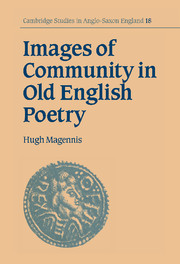Book contents
- Frontmatter
- Contents
- Acknowledgements
- List of abbreviations
- 1 Introduction: ideas of community and an Anglo-Saxon audience/readership
- 2 Hall and city, feasting and drinking: images of communal life
- 3 Hall and feasting in Beowulf
- 4 Hall and feasting: transformations and alternative perspectives
- 5 Personal in conflict with communal
- 6 The mythic landscape of Beowulf: sea, stronghold and wilderness
- 7 The dwelling-places of God's people: place and setting in biblical poetry
- 8 Places of trial and triumph in hagiographical poetry
- 9 Conclusion: community and power in later poetic and other texts
- Bibliography
- Index
3 - Hall and feasting in Beowulf
Published online by Cambridge University Press: 14 August 2009
- Frontmatter
- Contents
- Acknowledgements
- List of abbreviations
- 1 Introduction: ideas of community and an Anglo-Saxon audience/readership
- 2 Hall and city, feasting and drinking: images of communal life
- 3 Hall and feasting in Beowulf
- 4 Hall and feasting: transformations and alternative perspectives
- 5 Personal in conflict with communal
- 6 The mythic landscape of Beowulf: sea, stronghold and wilderness
- 7 The dwelling-places of God's people: place and setting in biblical poetry
- 8 Places of trial and triumph in hagiographical poetry
- 9 Conclusion: community and power in later poetic and other texts
- Bibliography
- Index
Summary
In all of Germanic literature the poem that makes the most extensive use of hall and feasting imagery is Beowulf. This poem draws upon the traditional ideas about the hall and feasting that we have seen in other works and finds in them a means of expressing central thematic preoccupations. Beowulf concerns itself profoundly with ideas to do with community and order. John D. Niles has argued, indeed, that the poem's ‘controlling theme’ is community, ‘its nature, its occasional breakdown and the qualities that are necessary to maintain it’. The poem contemplates human achievement and civilization in the face of a world of threat and hostility. The hall and life in the hall serve as the central images in the representation of this achievement and civilization. Through these images the poem also explores the limitations of a heroic society, for Beowulf shows threats to community to come from within as well as from without.
Hall and feasting images are particularly developed in the first (Danish) part of Beowulf. They contribute crucially to the emphasis on brightness and splendour that characterizes this part. In the second (Geatish) part of the poem there is less use of this imagery, and what there is occurs typically in elegiac contexts, most notably in the ‘last survivor’ passage, and in Beowulf's reprise of his adventures in Denmark. The hall of the Geats is splendid – ‘Bold wæs betlic’ – but the joys of the hall fade out of view as the poem approaches its end.
- Type
- Chapter
- Information
- Images of Community in Old English Poetry , pp. 60 - 81Publisher: Cambridge University PressPrint publication year: 1996



